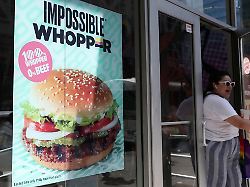class action approved
Burger King in court for allegedly too small Whopper
08/31/2023, 11:08 am
Customers in the US are angry because the fast-food chain’s burgers are said to be larger than what ends up on trays in the store. The chain faces a fine of millions. And not only Burger King is in the pillory.
Burgers, wraps and pizzas are smaller than advertised? In the US, many customers feel deceived. More and more cases are going to court. As the Reuters news agency reports, a judge has now rejected Burger King’s request to dismiss a dreaded class action lawsuit in which customers jointly accuse the chain of fraud because the whoppers are larger in photos than in reality.
As the responsible US federal judge in Miami explained, the burger chain must defend itself against the accusation of deliberate misleading. If the customers are right, it amounts to a breach of contract.
The advert photos, which featured ingredients “beyond the bun,” made it appear that the burgers were 35 percent larger and contained more than twice the meat than the chain actually serves, the class-action lawsuit says. Burger King counters that it is not necessary for burgers to look “exactly like the picture”. The judge said it was now up to the jury to decide.
According to the judge’s verdict, the plaintiffs may assert claims for negligent and unjust enrichment. The judge did not allow TV and online advertising as evidence. The reason given was: No specific “size” or a specific weight of the meatball was promised here.
Pressure on the industry is growing
Earlier this week, Burger King called the allegations “false”. The flame-grilled beef patties featured in the ad are the same ones used in the millions of Whopper sandwiches served across the country, it said.
In the USA, meanwhile, the pressure on the industry is growing. McDonald’s and Wendy’s – the fast food chain is one of the largest in the world and just as famous in the USA as McDonald’s and Burger King in this country – are already on trial on similar charges. The alleged difference between advertising and reality could be expensive for Burger King and Co. Each case could result in at least $5 million in damages.
A lawsuit against Taco Bell, the largest representative of Tex-Mex fast food, recently caused a stir. The subsidiary of Yum Brands – which also owns KFC and Pizza Hut – was sued in a Brooklyn court last month over wraps and pizzas that are said to be understuffed or topped. A verdict is still pending.
